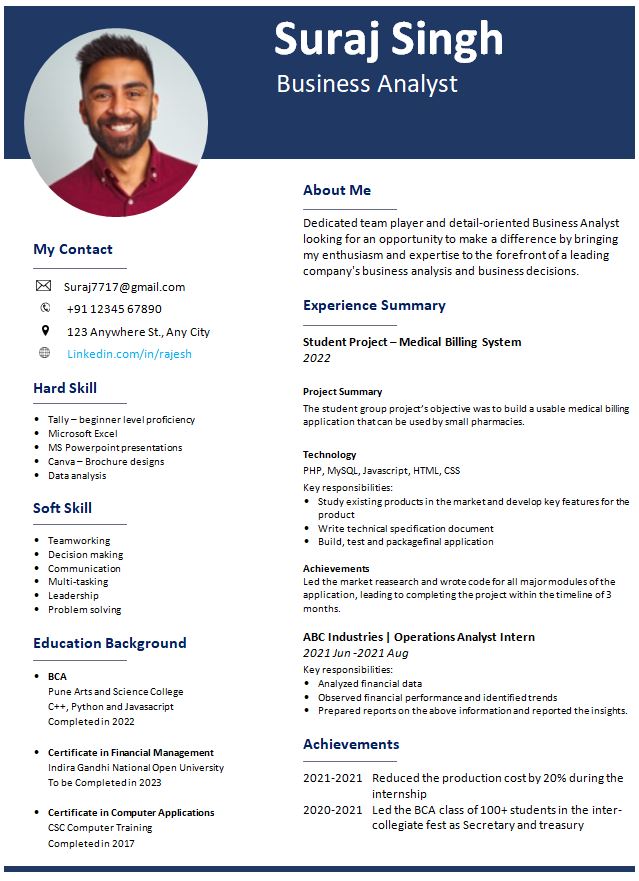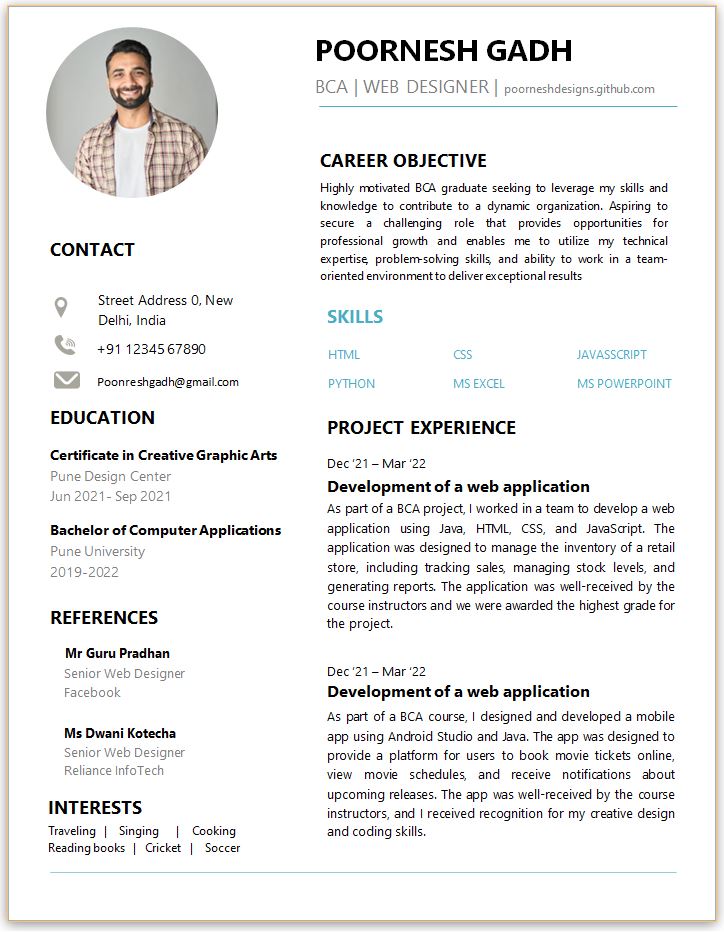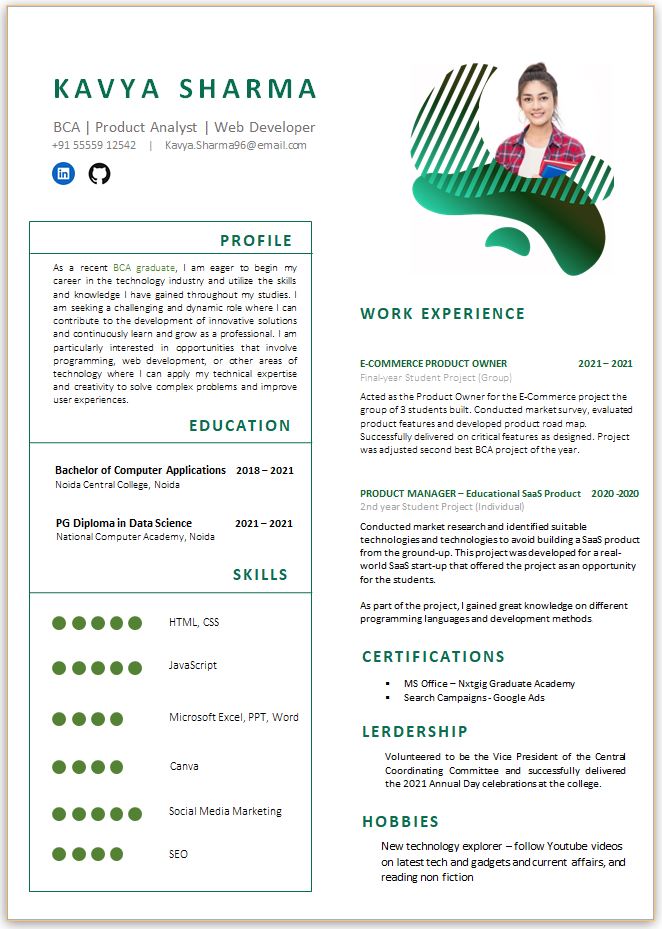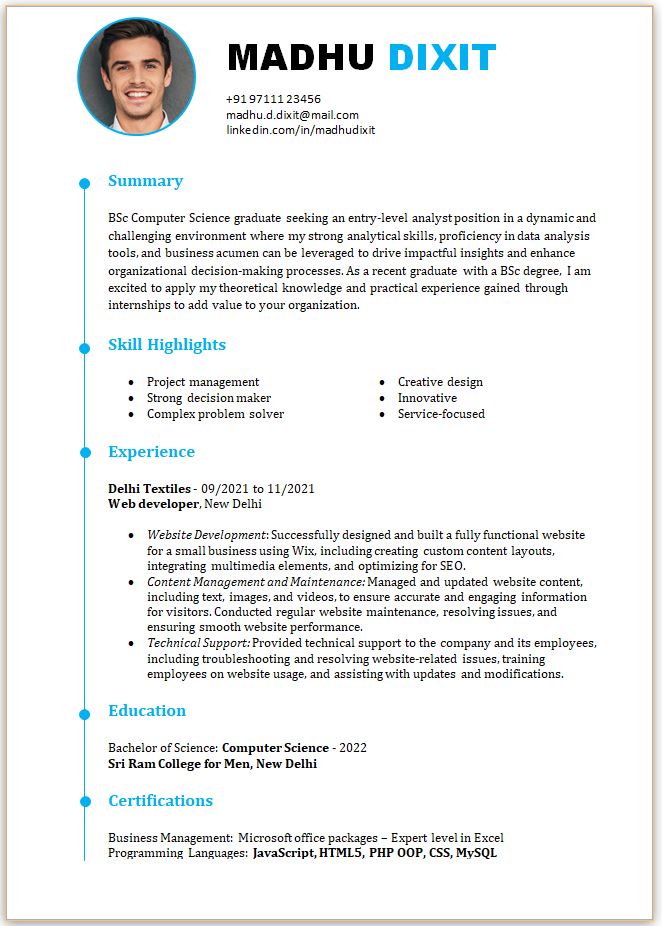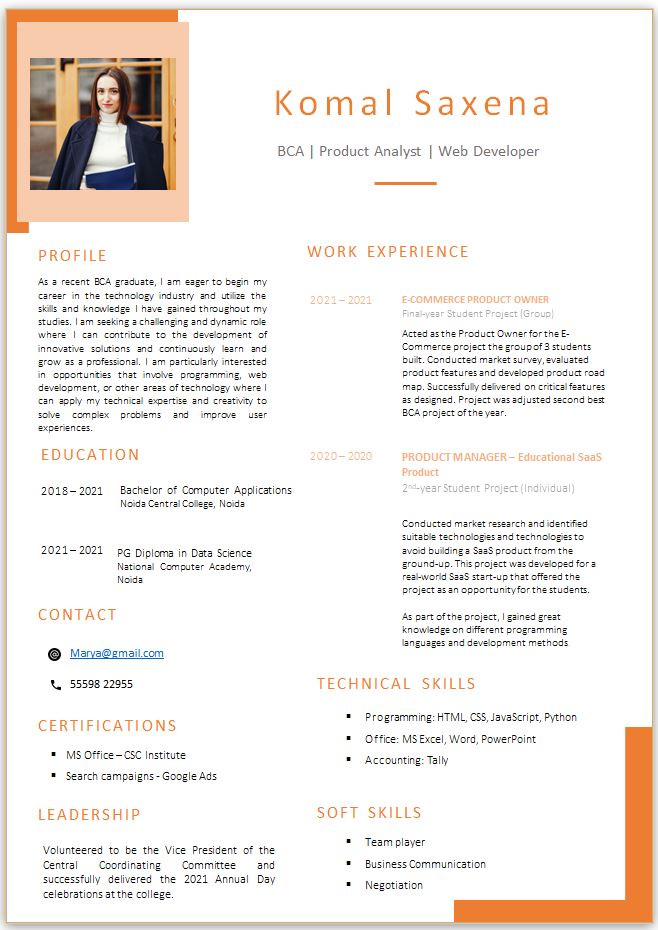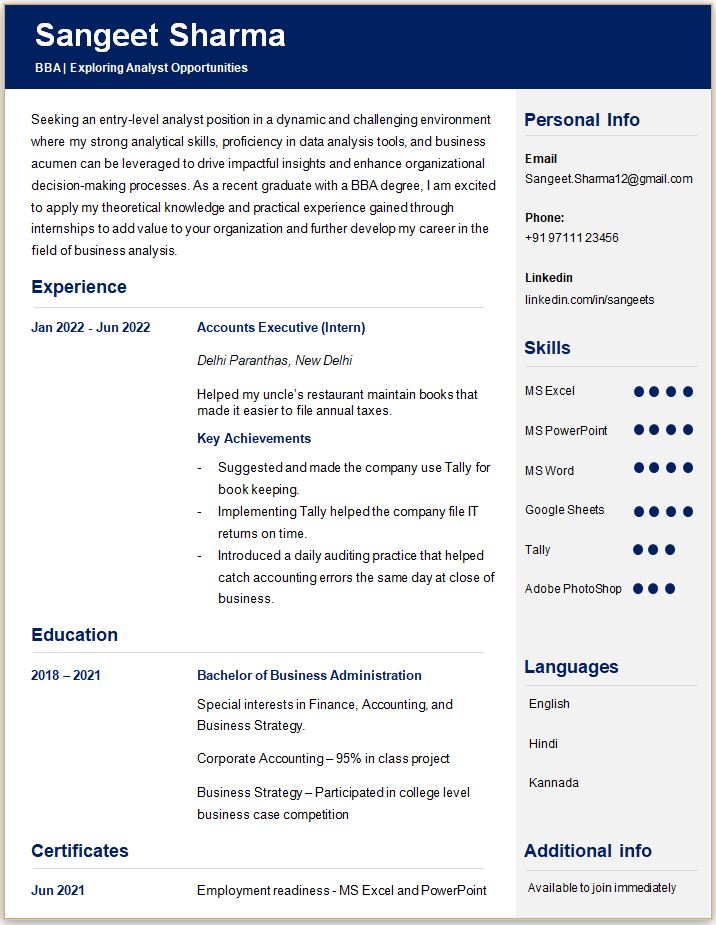Fresher Resumes

05 Feb 2024

How to create fresher resumes - resume for freshers
If you are in a rush, looking for ready to use, editable resume formats in MS Word, just scroll down to the section where we have listed them; else, read below as we have covered some very important pieces of advice as you build out your firsr resume.
A fresh graduate's resume can stand out by highlighting the following characteristics: Relevant coursework and skills, internship or work experience, extracurricular activities, professional formatting, and objective or summary statement.
1. Objective or summary statement:
Including an objective or summary statement can make a fresher's resume stand out. It should be concise and highlight the candidate's skills, education, and career goals.
Use the objective or summary statement to highlight your skills and career goals. Be concise and specific about what you can offer the employer.
Validate by tailoring your objective or summary statement to the job you are applying for. Make sure it reflects your understanding of the job and how your skills and goals align with it.
Overall, a fresher's career objective statement should demonstrate their knowledge, skills, and experiences that are relevant to the job they are applying for. A well-written career objective statement makes your resume look well-organized and professional-looking. A professional-looking resume is a resume that will stand out and make a positive impression on the employer.
2. Relevant coursework and skills:
Highlighting relevant coursework and skills that are directly related to the job can make a fresher's resume stand out. Employers want to see that the candidate has relevant knowledge and skills in the field they are applying for.
Be sure to include any coursework or skills that are directly relevant to the job you are applying for. For example, if you are applying for a marketing position, highlight courses you took in marketing or digital marketing.
Validate by providing specific examples of how you have applied what you learned in those courses in real-world situations. For example, if you worked on a marketing campaign for a class project, include details on what you did and how it contributed to the campaign's success.
3. Internship or work experience:
Any relevant internship or work experience can make a fresher's resume stand out. Even if it is not directly related to the job, it shows that the candidate has work experience and has developed skills such as time management, teamwork, and communication.
Even if you don't have direct work experience in the field you are applying for, highlight any transferable skills you gained from previous work experience or internships. For example, if you worked in customer service, highlight how you developed communication and problem-solving skills.
Validate by including specific examples of how you applied those skills in the workplace. For example, if you resolved a difficult customer issue, include details on how you did so and what the outcome was.
4. Extracurricular activities:
Highlighting any relevant extracurricular activities such as volunteer work, clubs, or projects can make a fresher's resume stand out. It shows that the candidate is well-rounded and has developed skills such as leadership, communication, and problem-solving.
Include any relevant extracurricular activities that demonstrate skills or interests that are relevant to the job you are applying for. For example, if you were part of a club that organized events, highlight your project management and teamwork skills.
Validate by including specific examples of your contributions to the activity or project. For example, if you organized a successful event, include details on how you did so and what the outcome was.
5. Professional formatting:
Having a well-organized and professional-looking resume can make a fresher's resume stand out. The resume should be easy to read, with clear headings and bullet points. It should also be free of any grammatical or spelling errors.
Make sure your resume is well-organized and easy to read. Use clear headings and bullet points to make it easy for the employer to scan.
Validate by having someone else, such as a professor or career counselor, review your resume for any errors or areas that could be improved.
We have written an exhaustive article on Creating a resume for freshers. You might want to give it a read.
Ready to use Fresher Resumes
If you are a fresh graduate, we have a great range of free resumes you can download and use for free. Choose the resume that works best for you, download, change essential information such as your name, contact info, college, graduation year etc., and use.Professional Summary samples for resume
Here are 10 most generic professional summary or career objectives one can use in their resume. If you are using any of these, just make sure to first edit the words within square brackets.
Industry specific professional summary sample
You will find below some examples of how a well-written career objective statement looks. If you like any of these below, simply replace [industry] with the industry your target job opportunity exists in.
Seeking an entry-level position in [industry] that will enable me to apply my passion for delivering results and my goal-oriented mindset to drive growth and success for the organization. I am a fast learner who is dedicated, loyal, and willing to work long hours to achieve company objectives. I am excited to contribute my skills and knowledge to a dynamic and innovative team.
Seeking an entry-level role in [industry], where I can apply my attention to detail, problem-solving skills, and enthusiasm for exceeding expectations to contribute to the success of the organization. I am highly goal-oriented and motivated to learn and grow, and I am dedicated to delivering quality results. I am a loyal team player who is willing to put in extra hours to achieve company objectives. I am looking for a position where I can work with a diverse group of individuals to tackle complex challenges.
As a recent graduate with a passion for [industry], I am seeking an entry-level position that will allow me to apply my creativity, drive to innovate, and ability to learn quickly to contribute to the success of the organization. I am highly goal-driven and motivated to exceed expectations, and I am a dedicated and loyal team player who is willing to work hard and put in extra hours to achieve success. I am looking for a position where I can work in a fast-paced and dynamic environment and contribute to the organization's growth.
Seeking an entry-level role in [industry], where I can leverage my education, skills, and enthusiasm to add value to the organization and advance my career. I am a highly motivated and dedicated individual with a goal-oriented mindset and a passion for exceeding expectations. I am a fast learner, committed to delivering quality results, and willing to work long hours to achieve success. I am looking for a position where I can work with a team of professionals who are passionate about their work and are committed to excellence.
As a recent graduate with a strong work ethic and a passion for [industry], I am seeking an entry-level position where I can learn and grow alongside a team of like-minded individuals. I am highly goal-oriented and motivated to exceed expectations, and I am committed to delivering quality results. I am a loyal team player who is willing to work hard and put in extra hours to achieve success. I am looking for a position where I can contribute my skills and knowledge to an organization that values innovation.
To obtain an entry-level position in [industry] where I can apply my strong analytical skills, attention to detail, and ability to learn quickly to contribute to the organization's growth and success. I am highly motivated and dedicated to delivering quality results, and I am a loyal team player who is willing to work long hours to achieve common goals. I am excited to be part of a team that values creativity, innovation, and professional development.
Degree specific professional summary sample
You will find below some examples of how a well-written career objective statement looks. If you like any of these below, simply replace [field] with your degree or area of focus. Some examples include "entry level position in Business Analysis" or "entry level positions in Project Management", etc.
To obtain an entry-level position in [field], where I can utilize my skills and knowledge to make a positive impact on the organization. I am a self-motivated individual who is eager to learn and grow, and I am committed to delivering quality results. I am a loyal team player who is willing to work long hours to achieve common goals. I am excited to be part of a team that values collaboration and innovation.
Seeking an entry-level role in [field], where I can leverage my education, skills, and enthusiasm to add value to the organization and advance my career. I am a highly motivated individual with a goal-driven mindset, a passion for exceeding expectations, and a strong desire to learn and grow. I am dedicated to delivering quality results, and I am a loyal team player who is willing to work hard and put in extra hours to achieve success. I am looking for a position where I can work with a team of professionals who share my values and are committed to excellence.
Degree and Skill specific professional summary sample
To secure an entry-level position in [field], where I can utilize my skills in [skill], [skill], and [skill] to contribute to the growth and success of the organization. I am a highly motivated individual with a passion for learning and a strong work ethic, and I am committed to delivering quality results. I am a loyal team player who is willing to work long hours to achieve common goals. I am excited to be part of an organization that values employee development and career advancement.
Degree and Industry specific professional summary sample
As a recent graduate with a degree in [field], I am eager to begin my career in [industry] and contribute to the organization's growth through my enthusiasm for exceeding expectations, my goal-driven nature, and my ability to learn quickly. I am a dedicated and loyal individual, willing to work long hours to achieve success. I am looking for a challenging and rewarding position where I can learn and grow.
What are resume formats availble?
There are several types of resume formats commonly used by job seekers. The choice of format depends on factors such as the individual's experience, skills, industry, and personal preference. Here are some popular resume formats.
Reverse Chronological Resume: This is the most common and widely used resume format. It emphasizes your work experience in reverse chronological order, starting with the most recent job. It highlights your career progression and is suitable for those with a stable employment history.
Since fresh graduates might usually only have internship or part time work experiences, the Chronological Resume format is ideal for candidates with many years of work experience. The logic behind putting the work experience right up there on the resume is because for the experienced candidates, their work experience outweighs their educational qualifications they would have acquired years ago.
Example of a Chronological Resume
You can see in this example how the candiate has listed their work experience in the reverse chronological order, i.e. the most recent first and then the second most recent next. This is the most ideal format for professionals with many years of work experience across several organizations.
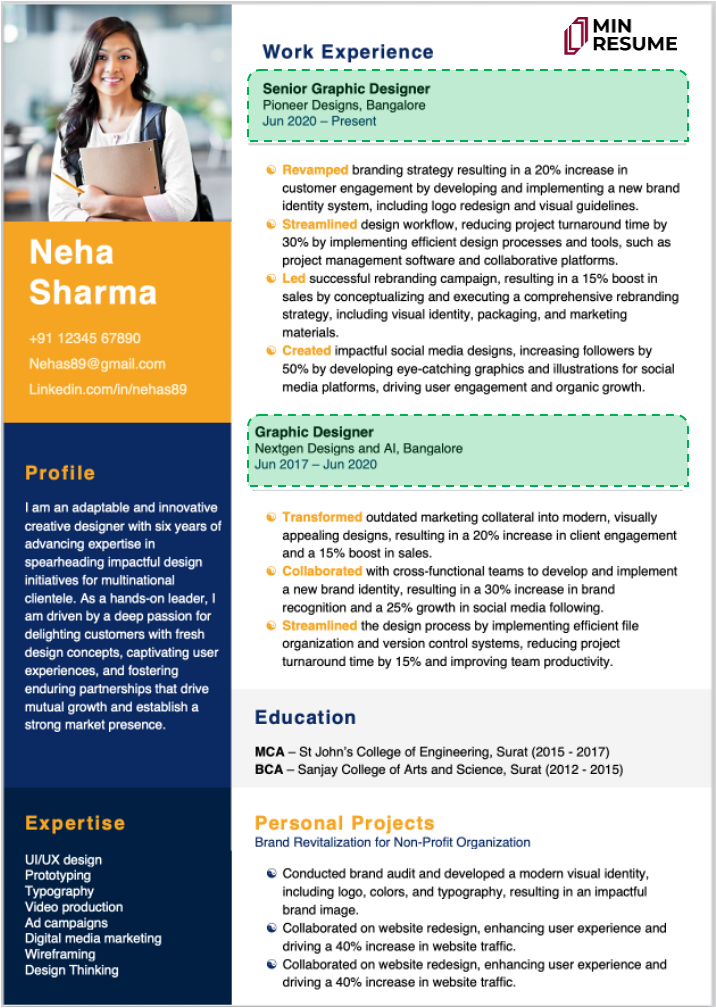
If you are a recent college graduate looking out for your first job, you are better off considering the next resume format, which is the Functional Resume format.
Functional Resume: This format focuses on your skills and abilities rather than your work history. It highlights relevant skills and achievements and is suitable for candidates who have gaps in their work history, are changing careers, or have limited work experience.
This is the most appropriate resume template to follow for fresh college graduates as this format helps showcase the candidate's skills, abilities and qualifications, which are great substitutes for the lack of work experience. Even if you have a couple of years of work experience, if you consider your work experience was very generic and if you are considering applying to a role that expects you to demonstrate specific skills on your resume, you are better off consider the Functional Resume template.
Example of a Functional Resume
You can see in this example how the candiate has borken down their work experience under headings that are skills or functional capabilities. Sometimes, the skills could not be this clearly divided across exmployments. In those cases, you may have to mention the employment where those skills and functional capabilities were demonstrated.
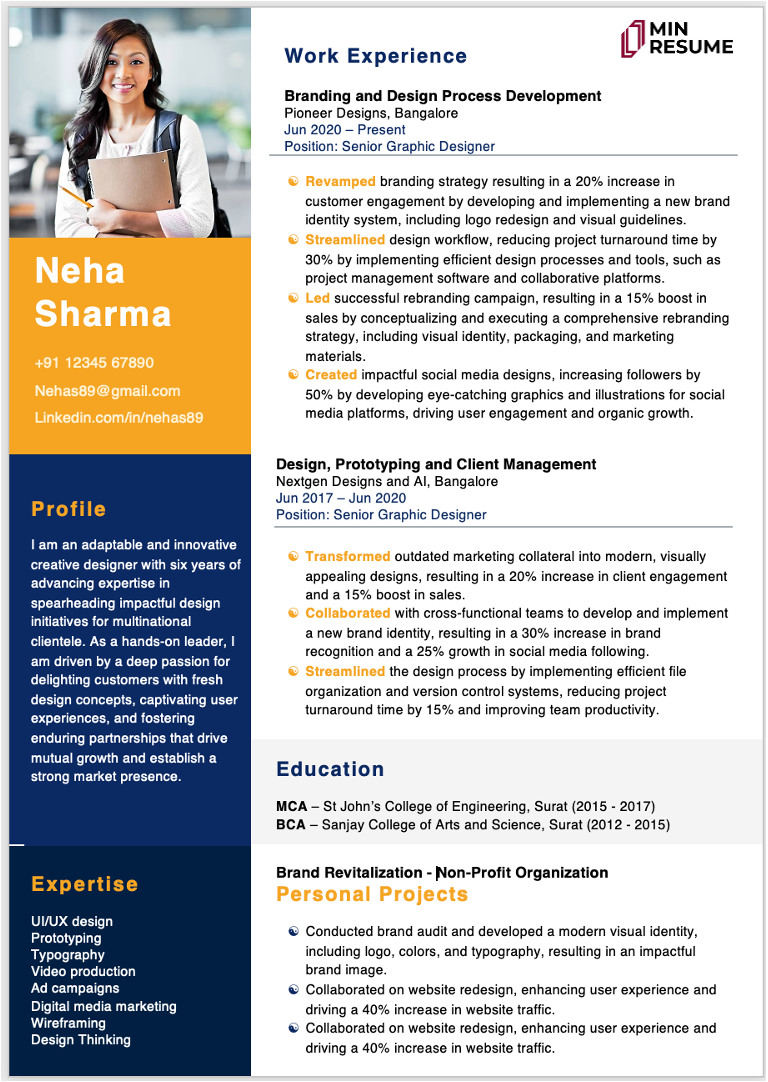
If you are a fresher and consider using this format, simply stack up your college projects or internship experiences below each skill or functional capability you want to showcase. These skills or functional capabilities that you want to showcase should correlate to the skills and capabilities that are listed on the job description; and, of course, you possess them in the first place and are able to demonstrate through clear descriptions on your resume and are able to back them up with explanations during the interview.
Combination Resume: Also known as a hybrid resume, this format combines elements of both the reverse chronological and functional formats. It showcases your skills and achievements while also providing a concise work history section. It's suitable for individuals with a diverse range of skills and experiences.
Targeted Resume: A targeted resume is tailored specifically for a particular job or industry. It highlights the qualifications, skills, and experiences most relevant to the desired position. This format allows you to customize your resume for each application, aligning it closely with the job requirements.
Infographic or Visual Resume: This format uses visuals, graphics, and design elements to present your information in a visually appealing and creative way. It can help your resume stand out, especially in design-related or creative fields. However, it should still maintain readability and be ATS-friendly (compatible with applicant tracking systems).
Example of an Infographic or Visual resume
You can see in this example how the candiate has listed their key skills through graphs and create visuals. This is a great way to gain attention immediately to your top strenghts. Again, of course, you have to have some key strenghts to use this style of resume format.
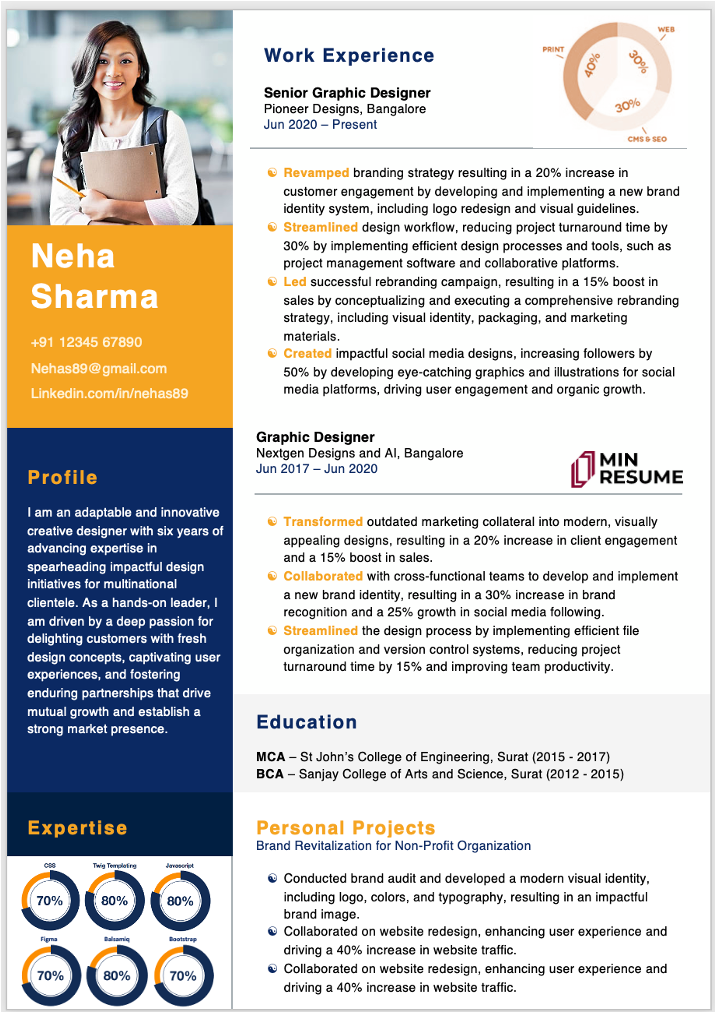
If you a recent college graduate and if you are in the creative domain like arts, design and web development, you would have a portfolio where you maintain your creations in the public domain. You should consider including links to your public portfolios on your resume. You could also consider pasting images of your creations along with the links to your portfolio on your resume. If you are in the technical or creative domain, even if you do not have work experiences, the Infographic or Visual resume template is a great style of resume to consider.
CV (Curriculum Vitae): CVs are typically used in academic, research, or scientific fields and provide a comprehensive overview of a person's education, publications, research projects, and other relevant information. Unlike resumes, CVs are often longer and more detailed.
We have a small article that specifically addresses the difference between CV and Resume. You might want to give it a quick read.
Top skills to consider adding on a fresher resume
When it comes to creating an impactful resume, content thumps formats. A key aspect of content quality of your resume is the list of skills you add. Skills is an essential section on your resume.
Whether you are looking for a speciic role in the realm of technical specialties like web development, cloud infrastructure, data science, legal, pharma, etc. or a generic role across industires as an analyst, intern or trainee, there are certain skills you should definitely consider including on your resume. These skills are in addition to the ones that you consider your primary skillsets that match the ones as primary on the Job Description for the role you are applying to. Including these skills that we are covering here will help show to the potential employers you possess some of the most relevant transferrable skills in the job market today.
1. MS Excel
Learning MS Excel can be highly beneficial for a fresh college graduates, regardless of the field of study. Quite simply, Excel is one of the top most widely used computer software applications in use across companies. Whether you work in marketing, sales, operations or HR, demonstrating a good hold on basic Excel skills will help you stand out among the competition and help you create a great first impression on your potential employer. Here are some key benefits as seen by your potential employers.
Improved Data Analysis and Reporting: Excel allows you to efficiently analyze and manipulate data, perform calculations, create charts and graphs, and generate reports. These skills are valuable in various roles and industries, as data analysis is crucial for decision-making, problem-solving, and presenting information effectively.
Increased Efficiency and Productivity: Excel offers numerous features and functions that can automate tasks, streamline workflows, and save time. Learning Excel helps you become more efficient in managing and organizing data, creating spreadsheets, and performing repetitive tasks. This can significantly boost your productivity in any job role.
Enhanced Financial Management: Excel is widely used in finance and accounting fields. It enables you to create budgets, track expenses, perform financial calculations, build financial models, and analyze financial data. These skills are essential for financial planning, forecasting, and managing budgets in both personal and professional contexts.
Versatility and Transferable Skills: Excel skills are transferable across industries and job roles. Proficiency in Excel demonstrates your ability to work with data, analyze information, and utilize spreadsheet software effectively. These skills are highly sought after by employers and can make you a valuable asset in many positions.
Career Advancement Opportunities: Many job postings across various industries list Excel proficiency as a required or preferred skill. By mastering Excel, you enhance your employability and open doors to a wider range of job opportunities. Excel skills can also contribute to career advancement, as they are often expected in managerial or analytical roles.
Resources for learning Excel online for free
There are several free resources available online to learn Excel at your spare time. You do not even need to have a computer to learn excel, although having a computer of whatever capacity and RAM size will only help develop real-world sense of how MS Excel is used in companies across functions. Here is a list of few hand-picked resources to help you learn MS Excel for free.
Microsoft Excel Help and Training: Microsoft offers free online resources, tutorials, and training materials on Excel. Visit the Microsoft Excel support website for official documentation, guides, and video tutorials.
YouTube Tutorials: YouTube has a vast collection of free Excel tutorials from various creators. Channels like ExcelIsFun, Excel Campus, and MrExcel offer comprehensive tutorials for beginners and advanced users.
Online Learning Platforms: Platforms like Coursera, edX, and LinkedIn Learning offer free or low-cost courses on Excel. You can explore courses such as "Excel Skills for Business" on Coursera or "Excel Essential Training" on LinkedIn Learning.
Excel Websites and Blogs: Websites like Exceljet, Chandoo, and Excel Easy provide free tutorials, tips, and templates to learn and enhance Excel skills.
Online Communities: Participate in Excel-related forums and communities like Reddit's r/excel or Microsoft Excel Community. You can ask questions, learn from others, and find helpful resources shared by the community.
Remember, practicing regularly and applying Excel skills to real-world scenarios will enhance your proficiency. Consider starting with beginner-level tutorials and gradually progress to more advanced topics as you gain confidence and experience.
2. MS PowerPoint
MS PowerPoint is a versatile application widely used across companies. Simply put, PowerPoint is a presentation software developed by Microsoft. It allows you to create visually appealing slideshows or presentations that combine text, images, charts, graphs, and multimedia elements to communicate information effectively.
A PowerPoint presentation is composed of individual slides. You can create new slides by selecting a slide layout, which determines the arrangement of placeholders for text, images, and other content. Common slide types include Title Slide, Content Slide, Two-Column Slide, and more. PowerPoint provides various tools to add and format content on slides. You can insert text boxes, shapes, images, charts, tables, and multimedia elements. Formatting options include changing font styles, adjusting colors, applying themes, aligning objects, and resizing elements.
PowerPoint offers built-in themes and design templates that give your presentation a consistent and professional look. You can choose from a variety of pre-designed themes, or customize them according to your preferences. Themes control the overall visual style, including fonts, colors, and backgrounds.
PowerPoint allows you to add slide transitions to create smooth visual effects when moving from one slide to another. Additionally, you can apply animations to individual elements on a slide to make them appear, disappear, or move in specific ways, adding interactivity and engagement to your presentation. So, learing PowerPoint is a very beneficial step a fresh graduate can take in improving their skillsets to offer to potential employers and the prospects of finding the first job.
Here are some of the transferrable skills that the potential employers will see in your resume when they see PowerPoint as one of your areas of expertise.
Effective Presentation Skills: Effective Presentation Skills: PowerPoint is widely used for creating presentations in academic, professional, and business settings. Mastering PowerPoint helps you develop effective presentation skills, enabling you to communicate ideas, data, and concepts in a visually appealing and engaging manner. This skill is valuable in various roles and industries.
Improved Communication: Improved Communication: PowerPoint allows you to organize information, structure content, and use visual elements such as charts, graphs, and images to enhance your message. Learning PowerPoint enables you to communicate complex ideas more effectively, ensuring clarity and understanding among your audience.
Enhanced Professionalism: Presentations created using PowerPoint can add a professional touch to your work. By mastering PowerPoint, you can create visually cohesive and well-designed presentations that convey professionalism and attention to detail. This skill can make a positive impression in job interviews, client meetings, and internal presentations.
Visual Storytelling: Visual Storytelling: PowerPoint provides a platform for visual storytelling, allowing you to create narratives that engage and captivate your audience. By learning PowerPoint, you can develop skills in structuring content, selecting impactful visuals, and designing slides that tell a compelling story. This can be particularly valuable in marketing, sales, and creative fields.
Collaboration and Teamwork: PowerPoint offers collaboration features that allow multiple users to work on the same presentation simultaneously. By learning these collaborative functionalities, you can effectively contribute to group projects, collaborate with colleagues, and streamline teamwork.
Resources for learning Miscrosoft PowerPoint online for free
There are several free resources available online to learn Excel at your spare time. You do not even need to have a computer to learn excel, although having a computer of whatever capacity and RAM size will only help develop real-world sense of how MS Excel is used in companies across functions. Here is a list of few hand-picked resources to help you learn MS Excel for free.
Microsoft PowerPoint Help and Training: Microsoft provides official documentation, tutorials, and training materials on PowerPoint. Visit the Microsoft PowerPoint support website for access to free resources, guides, and video tutorials.
YouTube Tutorials: YouTube hosts a wide range of free PowerPoint tutorials from creators like PowerPoint School, Presentation Process, and PPT Guru. These channels offer step-by-step guidance on various PowerPoint features and techniques.
Online Learning Platforms: Platforms such as Coursera, edX, and LinkedIn Learning offer free or low-cost PowerPoint courses. Look for courses like "Introduction to PowerPoint" on Coursera or "PowerPoint Essential Training" on LinkedIn Learning.
Online PowerPoint Communities: Engage with online communities like the PowerPoint subreddit (r/powerpoint) or the Microsoft PowerPoint Community to connect with PowerPoint enthusiasts, ask questions, and find helpful resources.
Microsoft Office Templates: Explore the built-in templates within PowerPoint itself. They provide a starting point for creating professional-looking presentations and can help you learn different design elements and layouts.
3. Data Analysis and Visualization
There is no industry or a job function that does not leverage data to make business decisions these days. Showing data analysis and data visualization as a skill on your resume will help you easily communicate to your potential employer that you possess critical thinking and problem solving skills and that you are someone adept at communicating insights as business actions.
Here are some resources that we found to be readily available, beginner-friendly and are either free or low cost to help you learn data analysis and visualisation skills quickly.
Online Learning Platforms: Platforms like Coursera, edX, and Udemy offer free or low-cost courses on data analysis and visualization. You can explore courses such as "Google Analytics Certificate" on Coursera or "Introduction to Data Analysis and Visualization with Python" on edX.
Data Visualization Tools: Familiarize yourself with popular data visualization tools such as Tableau Public , Google Data Studio, and Microsoft Power BI. These tools often provide free versions or trials, along with tutorials and documentation to help you learn.
Tutorials and Blogs: Websites like DataCamp, Towards Data Science, and Kaggle offer tutorials, articles, and resources on data analysis and visualization. They cover various tools, programming languages (e.g., Python, R), and techniques to help you learn and apply these skills.
YouTube Channels: YouTube hosts numerous channels dedicated to data analysis and visualization tutorials. Channels like Data School, Corey Schafer, and PyData provide free tutorials and walkthroughs on data analysis techniques and visualization libraries.
Open Datasets and Challenges: Practice your data analysis and visualization skills by exploring publicly available datasets on platforms like Kaggle, UCI Machine Learning Repository, and Data.gov. Participate in data analysis competitions or challenges to apply your skills in real-world scenarios.
Remember, hands-on practice and working with real data are essential to mastering data analysis and visualization skills. Start with small projects, explore different techniques, and gradually tackle more complex problems. Continuous learning, experimentation, and applying your skills to real-world scenarios will help you become proficient in data analysis and visualization.
4. Reporting
All business have produce and consume reports of various sorts. Microsft Excel is often one of the most widely used software packages in companies to produce reports. When you learn MS Excel, you are automaticaly learning all essential components of report preparation. The key difference between knwing MS Excel and being able to use it for reporting purposes if understanding why a report may be necessary in the first place. While this undertanding can develop easily within an organizational setting, you can still practice producing simple reports in MS excel and use charts and graphs to illustrate various numerical aspects of a report.
To practice your reporting skills in MS Excel, you can undertake mini projects once you have completed learning Excel and you are able to create simple calculations within your excel sheet. For example, you can obtain publicly reported financial results of your favourite public limited company and analyse how that company has performed in various areas such as revenue, operating income, profit and loss, and various other financial metrics that you can easily find formulae for online.
Kaggle is a site that has a lot of very interesting data sets that are easy to understand and practice building reports.
5. Written and Verbal Communication
Written and verbal communication skills are the media through which you will offer your skills to your employers. Simply put, without good written and verbal communication skills, no matter how strong one's technical skills are, the real value of those technical skills are seldom fully realzied to their potential.
Here are some resoures for you to consider using to polish your written and verbal communication skills.
Online Writing Guides: Websites like Purdue Online Writing Lab (OWL) and Grammarly offer comprehensive writing guides covering grammar, punctuation, sentence structure, and various writing styles. These resources provide tips and examples to improve written communication skills.
Online Courses and MOOCs: Platforms like Coursera, edX, and Udemy offer online courses specifically focused on improving written and verbal communication skills. Look for courses such as "Business Writing and Communication" or "Effective Public Speaking" to enhance your skills in these areas.
Books on Communication Skills: There are several books available that provide practical advice and strategies for improving communication skills. Some recommended titles include "Crucial Conversations" by Kerry Patterson, "Writing That Works" by Kenneth Roman and Joel Raphaelson, and "Talk Like TED" by Carmine Gallo.
Toastmasters International: Toastmasters is a non-profit organization dedicated to improving public speaking and leadership skills. Joining a Toastmasters club allows you to practice and receive constructive feedback on your speaking abilities in a supportive environment.
Online Public Speaking Resources: Websites like TED Talks, TED-Ed, and Speak Up offer resources and videos of inspiring speeches that can serve as examples and inspiration for improving your own public speaking skills. Analyze the techniques used by skilled speakers and practice delivering speeches or presentations.
Writing Workshops and Webinars: Keep an eye out for writing workshops or webinars organized by educational institutions, professional associations, or writing centers. These events often provide guidance, practice exercises, and personalized feedback on your writing skills.
Peer Review and Feedback: Engage with your peers or colleagues to exchange written work and provide constructive feedback to one another. This can help you identify areas for improvement, refine your writing style, and gain insights from different perspectives.
Internships and Volunteer Opportunities: Seek out internships or volunteer opportunities that involve tasks requiring strong written and verbal communication skills. These experiences provide practical opportunities to practice and showcase your abilities.
University Writing Centers: If you are still connected to your alma mater, inquire about the availability of writing centers or resources provided by the university. They often offer writing consultations, workshops, and access to additional writing resources.
Remember, practice and consistent effort are key to improving communication skills. Seek opportunities to communicate effectively in various contexts, whether through writing emails, participating in group discussions, or delivering presentations. The more you practice, seek feedback, and actively work on improving your skills, the more confident and proficient you will become in written and verbal communication.
6. Event management
All organizations have some sort of event that gets organized from time to time. This includes anything from team outings to corporate strtegy retreats also called offsites. By being able to demonstrate on your resume you have event management skills, you stand out from the competition as Event Management is often an overlooked skillset by many jobseekers.
So, what is event management? Event management is the skill of managing events from conceptualization to wrap up after the event is over. Event Management is a great skill to add to your resume since it helps communicate to the potential employer your several other important transferrable skills like organization, problem solving, team work, collaboration, communication, financial management and project management.
To demonstrate Event Management skill on your resume, consider adding a sepeate section called "Leadership" on your resume and list as bullet points all the events you have organized while in college or in your community. Some example event management projects to include on your resume are organization inter-collegiate events like fests, competitions, etc., any volunteering engagement you led in your community during the COVID pandemic, or flood relief efforts, or organizing a sporting event like being a captain of your local soccer team, etc.
7. Project Management
Including project management in the resume of a fresh college graduate can be highly beneficial for several reasons:
Demonstrates Leadership and Initiative: Project management skills highlight your ability to take charge, lead a team, and drive projects to successful completion. It shows that you can take initiative, organize tasks, and manage resources effectively.
Versatility and Adaptability: Project management skills demonstrate your ability to work on diverse projects and handle different responsibilities. This versatility is valuable to employers, as it showcases your capacity to handle various challenges and adapt to different situations.
Transferable Skills: Project management involves a range of transferable skills that are highly sought after in many industries. These skills include organization, planning, time management, problem-solving, communication, teamwork, and critical thinking. Highlighting these skills on your resume makes you a well-rounded candidate.
Employability and Career Advancement: Project management is a highly valued skill set in today's professional landscape. By showcasing project management experience, you increase your employability and open doors to a wide range of job opportunities. It also sets you up for potential career advancement, as project management skills are often sought after for managerial and leadership roles.
Evidence of Real-World Application: Including project management experience on your resume provides concrete evidence of your ability to apply theoretical knowledge and academic learning in real-world scenarios. It demonstrates that you can translate concepts into practical results, making you a more credible and attractive candidate to potential employers.
Teamwork and Collaboration: Project management involves working with cross-functional teams and stakeholders. By including project management experience, you highlight your ability to collaborate effectively, communicate with team members, delegate tasks, and ensure project goals are achieved collectively.
Problem-Solving and Results-Oriented: Employers value candidates who can identify and solve problems efficiently. Project management experience shows that you can analyze challenges, develop strategies, and implement solutions to achieve project objectives and deliver results.
When including project management on your resume as a fresh college graduate, be sure to highlight specific projects you have managed, outlining your roles, responsibilities, achievements, and outcomes. Additionally, consider obtaining relevant certifications such as the Project Management Professional (PMP) certification or PRINCE-2, which can further enhance your credibility and marketability in project management roles.
Resources to learn Project Management
There are various resources available to learn project management for recent college graduates. Here are some options to consider:
Online Courses and Certifications- Project Management Institute (PMI): PMI offers the Project Management Professional (PMP) certification, which is widely recognized in the industry. They also provide online courses and resources for project management.
- Coursera: Coursera offers a range of project management courses from reputable institutions such as the University of California, Irvine and the University of Virginia.
- edX: edX provides project management courses from renowned universities and organizations, including Harvard University and the Rochester Institute of Technology.
- "A Guide to the Project Management Body of Knowledge (PMBOK Guide)" by PMI: This is the official guide for project management professionals and covers the standard practices and methodologies in project management.
- "The Fast Forward MBA in Project Management" by Eric Verzuh: This book provides a comprehensive overview of project management concepts and techniques.
- "Project Management for Dummies" by Stanley E. Portny: This beginner-friendly book offers practical insights and tips for managing projects effectively.
- Asana: Asana is a popular project management tool that offers resources and templates to help users understand project management principles and best practices.
- Trello: Trello is a visual collaboration tool that provides guides and resources for project management beginners.
- Microsoft Project: Microsoft Project is a comprehensive project management software. Their website offers tutorials and resources to help users learn project management concepts while using their software.
- ProjectManager.com Product Training Videos: This website offers various resources, including articles, templates, and videos, covering project management topics and best practices.
- Project Management Institute (PMI) Blog: PMI's blog provides insights, trends, and case studies related to project management.
- Project Times: Project Times is an online publication that covers a wide range of project management topics, including articles and expert advice.
- Look for local project management associations or chapters of professional organizations like PMI. They often organize workshops, networking events, and educational sessions that can help you learn project management skills.
- Join project management communities and forums like Reddit's r/projectmanagement or LinkedIn groups dedicated to project management. Engage in discussions, ask questions, and learn from experienced professionals.
8. Product Management
Including product management on your can be highly beneficial for the following reasons:
Demonstrates Business Acumen: Product management involves understanding market dynamics, customer needs, and business objectives. By showcasing product management skills, you demonstrate your understanding of how products fit into the broader business strategy and your ability to contribute to achieving business goals.
Customer Focus and Problem Solving: Product managers are responsible for identifying customer pain points, conducting market research, and developing solutions. Including product management on your resume highlights your ability to analyze customer needs, empathize with users, and develop innovative solutions to address their problems.
Cross-functional Collaboration: Product management requires collaboration with various teams, such as engineering, design, marketing, and sales. By including product management experience, you showcase your ability to work effectively with diverse stakeholders, communicate across departments, and drive projects to successful completion.
Strategic Thinking and Decision Making: Product managers are involved in setting product vision, defining roadmaps, and making strategic decisions. Including product management on your resume indicates your aptitude for strategic thinking, data-driven decision making, and the ability to prioritize initiatives based on business objectives.
Entrepreneurial Mindset: Product management often involves taking ownership, being proactive, and taking calculated risks. By showcasing product management skills, you convey your entrepreneurial mindset, adaptability to ambiguity, and willingness to take responsibility for the success of a product.
I also want to give you a few resources for you to start learning Product Management. Here are a few hand-picked, beginner-friendly resources.
"Cracking the PM Interview" by Gayle Laakmann McDowell and Jackie Bavaro: This book provides a comprehensive guide to preparing for product management interviews, covering topics such as product design, metrics, analytics, and estimation techniques.
Product Management Courses on Udemy: Udemy offers a wide range of product management courses, including "Become a Product Manager" by Cole Mercer and Evan Kimbrell, which covers the fundamentals of product management, as well as more specialized courses on topics like agile methodologies and user experience (UX) design.
Product Management Associations and Communities:- Product School: Product School offers both in-person and online product management courses, workshops, and certifications. They have a strong community of product managers and provide opportunities for networking and career support.
- Online Product Management Communities: Join online communities like Mind the Product, Product Management Reddit, or LinkedIn groups focused on product management. Engaging with these communities allows you to learn from experienced professionals, participate in discussions, and gain insights into current trends and practices in the field.
9. SQL
SQL, which stands for Structured Query Language, is a language used to communicate with databases. It's like a special language that helps us talk to databases and ask them questions.
Imagine a database as a big organized collection of information, like a filing cabinet with lots of drawers and folders. Each drawer represents a table, and each folder within the drawer represents a row in that table. The rows contain different pieces of information called data.
Now, to retrieve specific data from the database or perform actions on the data, we use SQL. It allows us to write instructions called queries that tell the database what we want to do. For example, we can ask the database questions like "Give me all the names of customers who bought a particular product" or "Calculate the total sales for each month."
SQL is designed to be easy to understand and use. It has a simple syntax with specific keywords and commands that let us perform operations like selecting data, inserting new data, updating existing data, or deleting data from the database.
Think of SQL as a language that helps us talk to databases and get the information we need. It's like having a conversation with the database to find out what we want to know or to make changes to the stored data.
So, in a nutshell, SQL is a language used to interact with databases and retrieve, manipulate, and manage data stored within them. It's an essential tool for working with data in various applications and industries.
Independent of the job type or the industry you are applying to for a position, including SQL as a skill on your can be highly beneficial for the following reasons:
Data Handling and Analysis: SQL (Structured Query Language) is a widely used language for managing and analyzing data. Including SQL on your resume demonstrates your ability to work with databases, perform data manipulation, and extract valuable insights from data, which is valuable in various industries and roles.
Efficiency and Automation: Proficiency in SQL allows you to write efficient and optimized queries to retrieve data from databases. This skill can improve productivity and streamline data-related tasks, making you a valuable asset in organizations that deal with large datasets.
Business Intelligence and Reporting: SQL is commonly used in business intelligence and reporting tools. By including SQL on your resume, you showcase your ability to retrieve and analyze data to generate reports, visualizations, and dashboards that facilitate data-driven decision-making.
Collaboration with Data Teams: Many organizations have dedicated data teams or data analysts who rely on SQL for data management. By including SQL as a skill, you indicate your ability to collaborate effectively with data professionals, understand their requirements, and communicate effectively when working with data.
Versatility and Transferability: SQL is a versatile skill applicable across various database systems, including popular ones like MySQL, PostgreSQL, Oracle, and Microsoft SQL Server. This versatility makes you adaptable to different environments and increases your employability in roles that involve data analysis and database management.
Top 3 resources to learn SQL
- W3Schools SQL Tutorial: Product School offers both in-person and online product management courses, workshops, and certifications. They have a strong community of product managers and provide opportunities for networking and career support.
- SQLZoo: SQLZoo is an interactive platform that offers SQL tutorials and exercises. It provides a hands-on learning experience, allowing you to practice SQL queries in an interactive environment.
- Codecademy's Learn SQL Course: Codecademy offers an interactive course that covers SQL fundamentals. The course includes practical exercises and projects to reinforce your learning.
Certifications on fresher resumes
You should consider including certifications on your resume. If you do not have any certifications yet, you can review some of the resources we refer to in this section below, but before that let us see what the benefits are in including certifications on a fresher resume:
Enhanced Credibility and Validation: Certifications serve as evidence of your knowledge and skills in a specific area. They validate your expertise and provide credibility to your resume, especially when you have limited work experience as a fresh graduate. Certifications show that you have invested time and effort to acquire specialized knowledge, which can differentiate you from other candidates.
Relevant Skill Demonstration: Certifications allow you to showcase your proficiency in specific skills or technologies that are relevant to the job or industry you're targeting. They provide a tangible representation of your capabilities and give employers confidence in your ability to handle tasks related to the certified area.
Industry Recognition and Standards: Certifications are often issued by reputable organizations or industry bodies that set standards and best practices. By including certifications on your resume, you demonstrate your commitment to adhering to industry-recognized standards and your willingness to stay updated with the latest advancements in your field.
Competitive Edge and Increased Employability: In a competitive job market, certifications can give you an edge over other candidates. Employers often value candidates who proactively seek to expand their knowledge and skills through certifications. Having relevant certifications can make you a more attractive candidate and increase your chances of getting shortlisted for interviews.
Fill the Experience Gap: As a fresher, you might have limited professional work experience. Certifications can help bridge the experience gap by showing that you have acquired practical skills and knowledge through formal training or certification programs. This demonstrates your commitment to continuous learning and can compensate for the lack of work experience to some extent.
Networking and Learning Opportunities: Pursuing certifications often involves interacting with professionals in the field, attending training sessions, or participating in online communities. These activities provide networking opportunities and can expand your professional connections. Additionally, certification programs often offer learning resources, webinars, or forums where you can continue to grow your knowledge and stay updated.
When including certifications on your resume, focus on those that are most relevant to the job you're applying for. Tailor your resume to highlight the certifications that align with the desired skills and qualifications mentioned in the job description.
It's important to note that while certifications can be valuable, they should complement your overall qualifications and experiences. They should not overshadow other critical sections of your resume, such as education, projects, internships, or relevant extracurricular activities. Strive for a well-rounded resume that showcases a combination of certifications, education, practical experiences, and soft skills to present a comprehensive picture of your capabilities.
Resources for free certifications for freshers
Here are some free certification resources available for freshers covering the most important skills to list on the resume we covered earlier.
MS Excel- Microsoft Office Training Center: Microsoft offers free training modules and tutorials for MS Excel on their official Office Training Center website. You can access interactive lessons, video tutorials, and practice exercises to enhance your Excel skills. Link: Interactive lessons
- Excel Easy: Excel Easy provides free tutorials and lessons for beginners to advanced users. It covers various topics with step-by-step instructions and examples. Link: Excel-Easy
- Microsoft Office Training Center: Similar to Excel, Microsoft's Office Training Center offers free resources and tutorials for PowerPoint. You can learn how to create engaging presentations, work with slide designs, and utilize PowerPoint features effectively. Link: Interactive lessons
- PowerPoint School: PowerPoint School provides free PowerPoint templates, tutorials, and tips to improve your presentation skills. It covers topics like slide design, animations, and effective communication through presentations.Link: PowerPoint School
- 280 Group: 280 Group offers a free "Product Management Fundamentals" course, which covers key concepts and skills in product management. It provides an overview of the product lifecycle, market analysis, roadmapping, and more.
- Mind the Product: Mind the Product: Mind the Product is a community for product managers, offering a variety of free resources, articles, webinars, and podcasts. It provides insights, best practices, and industry trends in product management. Link: Mind the Product
- Project Management Institute (PMI): PMI offers a free "Project Management Basics" course for beginners, which covers fundamental concepts and terminology in project management. It provides an overview of the project management framework and key processes. Link: Project Management Training
- ProjectManagement.com: ProjectManagement.com provides free resources, webinars, templates, and articles on various project management topics. It offers insights and practical guidance for project managers at all levels. Link: Project Management Guidance
- Google Analytics Academy: Google Analytics Academy provides free online courses on Google Analytics, covering topics like data analysis, tracking, reporting, and understanding user behavior. It offers beginner to advanced level courses. Link: Google Analytics Academy
- edX: edX offers free online courses on analytics and data analysis from renowned universities and institutions. You can find courses on topics like data visualization, data-driven decision making, and data analysis techniques. Link: Analytics on edX
- SQL Zoo: SQLZoo is an interactive platform that offers free SQL tutorials and exercises. It provides a hands-on learning experience to practice SQL queries in a web-based environment Link: SQL Interactive Learning
- Mode Analytics SQL School: Mode Analytics offers a free SQL School that covers SQL fundamentals and advanced topics. It includes interactive lessons, quizzes, and exercises to enhance your SQL skills. Link: SQL Fundamentals and Advanced
You can do it
There are thousands of jobs that hiring managers and recruiters across companies that span the entire spectrum of the size of the companies trying to fill every single day. There are more jobs than there are qualified candidates. If you are frustrated about not finding a job, don't be. Just add one technical skill that your dream job needs and do cold calling. You will be amazed at how quickly you can find your first job.
Now that you've read it
If you have found this article useful for you, you can spread some love and share the link to this article with your fellow BCA graduates looking for their first job.
